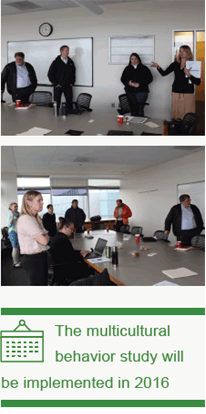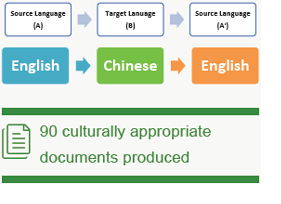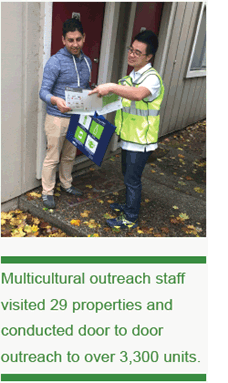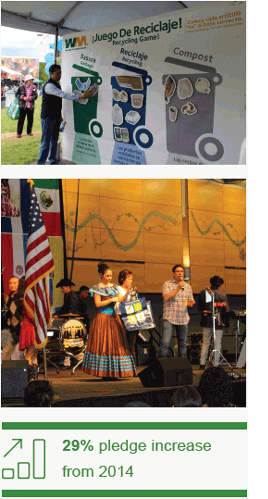

|
MULTICULTURAL
Behavior Study
|

|
Waste Management is expanding its first-of-its-kind Recycling Behavior Study to
the Latino community in an effort to learn more about habits and beliefs regarding
recycling and composting. In 2015, Waste Management finalized the study's
design with innovative recruitment strategies, reviewed the feasibility of the various
methodologies for each county and established an implementation plan. The
team considered numerous recruitment options and identified the advantages,
disadvantages and keys to success with each tactic. Ultimately selecting two
methodologies:
- Hybrid Double-Concurrent Recruitment: Potential respondents will be presurveyed
at a strategic central retail location and those who meet the criteria will
be scheduled for in-depth surveys at a later date.
- Combined Organization Outreach: Strategic partnerships are formed with
Community Based Organizations (CBO) or Faith Based Organizations (FBO)
and advocates within those organizations will be identified to conduct recruiting.
Those who meet the criteria will be scheduled for in-depth surveys at a later date.
The team conducted research into the feasibility of the two recruitment options and
identified the potential geographic locations in each county where the desired priority
audience group lived. The potential CBO/FBO partners and retail locations were
cross-referenced with geographic locations to see if these partnerships would
help with recruitment of the desired participants. The analysis suggested there was
a higher probability of success in Snohomish County through the hybrid double-concurrent
recruitment methodology, and in King County through the combined
organization outreach.
The Multicultural Behavior Study with a focus on Spanish-dominant speaking residents
will be implemented in 2016.

|
Transcreated Materials
|

In 2014, Waste Management, King County and Snohomish County
launched a transcreation project to develop in-language garbage, recycling
and compost guidelines that are appealing and culturally relevant to
populations who speak: Amharic, Chinese (Mandarin and Cantonese), Hindi, Korean, Russian, Somali and Vietnamese in King and Snohomish Counties, excluding Seattle.
The purpose of the project is to better communicate Waste Management
service guidelines to more community members. To accomplish this, Waste
Management, along with King and Snohomish Counties, recruited native
speakers to help with the project to ensure the Waste Management signage
was culturally relevant. The transcreation model for this project was:
- Research and Planning: The research and planning phase included copy-editing and redesigning of the original source
content (copy, images and layout) of the guidelines, researching and evaluating word choice and identifying culturally
relevant images.
- Usability Testing: Usability tests were conducted in a two-phase process over four days. First, four to six individuals from
households within each language group were recruited to receive and utilize the in-language guidelines for three days while
doing a simple three-day, in-home exercise. On the fourth day, a moderation team interviewed one participant from each
household on their experience.
- Modifications: At this stage, the results were compiled into a set of actionable directives intended to optimize the
effectiveness of the guidelines. These directives then led to changes in copy, images and design, and were informed by the
analysis.
- Community Review: The community members or "returning" participants were asked to provide any high-level feedback of
the copy, images and layout.
In all, the transcreation project produced two sets of in-language guidelines for the seven language communities as well as two
sets of corresponding English back translated guidelines for each county. This is a total of 90 individual documents produced with
new, culturally relevant messaging.
|
Multicultural Outreach
|

Waste Management conducted targeted door-to-door outreach to multicultural
multifamily properties (MMP) in Snohomish County in late 2015. The goal for this work
was to better serve non-English speaking communities in Snohomish County and address
language barriers that hamper effective recycling on multifamily properties.
Waste Management provided recycling information in eight languages and provided
multilingual tote bags. In addition, waste audits of recycling and garbage containers were
performed and new decals (which were both photo based and multilingual) were applied
when appropriate. Multilingual staff went door-to-door at targeted properties to speak
with residents about recycling and to distribute educational materials, including recycling
tote bags. In total, outreach staff visited 29 properties and went door-to-door at 3,343
units. Residents and property managers reported appreciating the multilingual outreach,
and were especially appreciative of the recycling tote bags.
For approximately 20 percent of all the residents that received door-to-door outreach,
English was not their primary language. The outreach was delivered in seven languages, Amharic, Arabic, Korean, Somali, Spanish, Tigrigna and Vietnamese. A total of 13
languages were identified when going door-to-door including the seven languages
mentioned before, as well as Mandarin, Cantonese, Russian, Hindi, Indonesian and
Tagalog.
|
Hispanic Events 2015
|

For the second year in a row, the Waste Management team expanded its
series of summer events to include the Latino community in 2015. The Waste
Management Spanish-language Recycling Information Station encouraged
families and children in a 30-second hands-on learning opportunity on how
to properly sort waste into recycle, compost and garbage bins.
This year, the summer events kicked off at Fiesta Premio Esmeralda, an iconic and wellrecognized
Latino community event hosted by Emerald Downs in Auburn, Washington.
In July, the team engaged with attendees at Hispanic Seafair, which attracted a
very diverse group of Latino community members. Finally, Waste Management
participated once again in Fiestas Patrias, the largest community event during
Hispanic Heritage Month. At this event, Waste Management collaborated with
King County's Recicla más program to offer a wide variety of information on topics
ranging from recycling and composting to textile recycling to the event goers. At
these three events in 2015, Waste Management conducted over 800 one-on-one
outreach, 786 families received a tote bag and nearly 300 Latino people played
the Recycling Information Station's interactive sorting game. Additionally, 463
people pledged to use the Spanish guidelines at home to recycle right and recycle
often. The 62 percent pledging to recycle more and use the tools provided is an
incredible increase from 33 percent in 2014.
|
|
|
|
|


